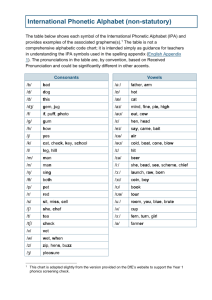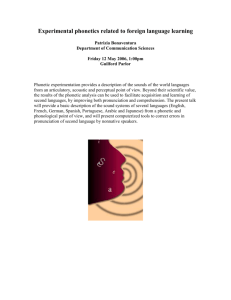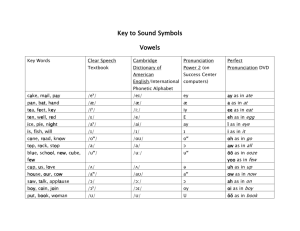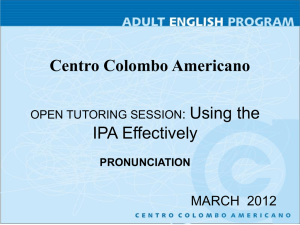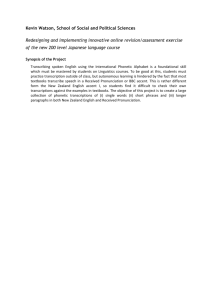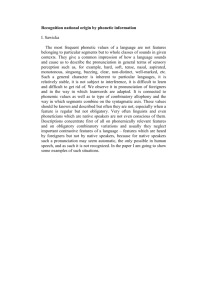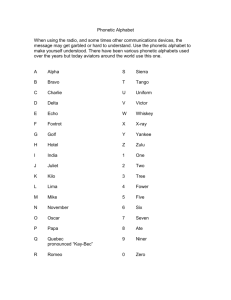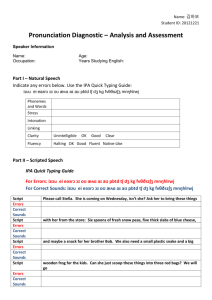IPA : International Phonetic Alphabet, a group of symbols used
advertisement
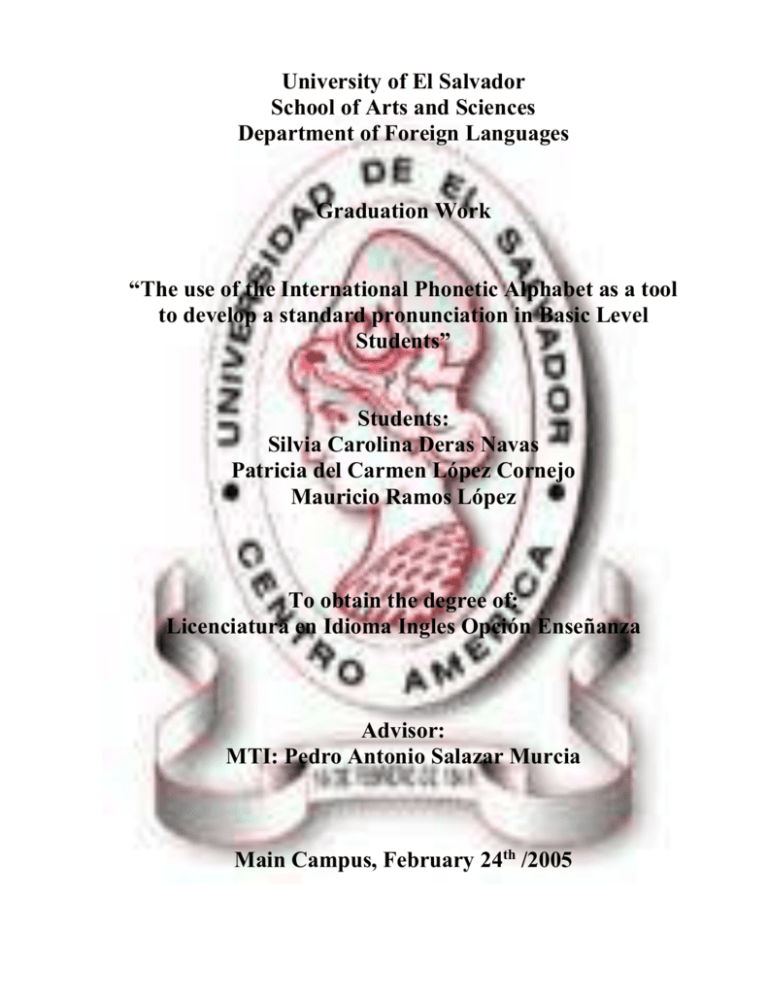
University of El Salvador School of Arts and Sciences Department of Foreign Languages Graduation Work “The use of the International Phonetic Alphabet as a tool to develop a standard pronunciation in Basic Level Students” Students: Silvia Carolina Deras Navas Patricia del Carmen López Cornejo Mauricio Ramos López To obtain the degree of: Licenciatura en Idioma Ingles Opción Enseñanza Advisor: MTI: Pedro Antonio Salazar Murcia Main Campus, February 24th /2005 INDEX Pag. Authorities ………………………………..… i Acknowledgements …………………………. ii Glossary …………………………………….. vi Essay …………………………………………. 1-16 Annexes - Research’s Profile - Data Gathering Instruments - Training Plan AUTHORITIES RECTOR: DRA. MARIA ISABEL RODRIGUEZ SECRETARY GENERAL: LICDA. ALICIA MARGARITA RIVAS DEAN OF THE SCHOOL OF ARTS: MD. ANA MARIA GLOWER DE ALVARADO SECRETARY OF THE SCHOOL OF ARTS: LICDA. ORALIA ESTHER ROMAN DE RIVAS HEAD OF THE DEPARTMENT OF FOREIGN LANGUAGES: MTI. EDGAR NICOLAS AYALA COORDINATOR OF THE GRADUATION PROCESS: MTI. PEDRO ANTONIO SALAZAR MURCIA Acknowledgments To God: Everlasting source of love and wisdom, light and inspiration in my darkness. Thy mercy makes me go the right way. To my Parents: Mom-Dad you are an example that God Almighty gives intelligence, wisdom, love, courage, honesty, faith and willingness to human beings. You both mean all that and more to me. To my Sisters and Brother: I love and admire you all a lot because of the very special virtue each one of you Possess. To my Nephews and Nieces: It is in your hands the difficult task to remedy all the harm and mistakes your Predecessors make. To my Teachers: Specially those whose task was not merely to teach but to share knowledge and wisdom guiding students to make appropriate decisions. To my friends: Thank you for being there when I needed you the most. To all of you whose blood was spilled to forgetfulness. Your precious liquid flowed into the ocean where the waves brought it back to a bunch of hearts. Silvia Deras Acknowledgments To God: The almighty being who gives life and existence. To my Parents: Who have cared of me from my birth. To my teachers: Specially those who go farther than instructing future professionals. To a special lost friend: Who helped me to make right decisions. To my friends and classmates: Who supported and reinforced my learning in different ways. To my Family: Who have contributed to improve my life. THANKS!! Mauricio Ramos Acknowledgments To God Almighty: For giving wisdom to end my career and strength to turn out well even though with much trouble. For giving me health and support at the moment I need it the most. For allowing me to reach this goal in my life. Thanks as always. To my family: For being patient and give me the opportunity to overcome my fears and stay with me in moment that I felt alone. For their usual support, confidence and encouragement. Also, for the opportunity of being a professional, for the effort and sacrifice they also take in this period of time. For their advice and love toward me. To my advisor: Lic. Pedro A. Salazar who provided us outstanding research assistance to this Research; also, for his suggestions to improve and enrich our essay. To my teachers: For teaching all the knowledge they have and share all the experiences, for showing me every single thought that makes me a professional and contributed to my learning process. To my friends: For their friendship and helpfulness because we learned each step together. The big efforts each one made to finish this career. To every person who supported me in those moments we cannot continue, and where there even with just one word to take my loneliness out, it is impossible to thank them all by their names, but thanks a lot for the rest of my life. Patricia Lopez Special Acknowledgments This Graduation process would not have been possible without the collaboration of many people; therefore, we want to thank them all for the timely and unconditional help. Specially: To Basic Level Students of the department of Foreign Languages. To all those students who voluntary participated in the research process. To Basic English teachers semester I/05 To our advisor MtI. Pedro Antonio Salazar Murcia. To Maritza, our friends, and all the people who contributed for this process to be feasible. THANKS A LOT! GLOSSARY Articulators : the different parts of the mouth area that we use when speaking, such as: lips, tongue, soft palate, teeth and jaw. Aspiration : means the action of pronouncing a sound with a puff of released breath. Certain consonants in English ([p], [t], [k], and [h]) are aspirate sounds. They should be produced with a strong puff of air. Control Group : group of students who attended to the training period on the use of the International Phonetic Symbols DFL : Department of Foreign Languages Experimental Group: group of students who did not receive any training but attended an Oral Reading Evaluation. Gum Ridge : the hard part of the roof of your mouth which is just behind your upper front teeth. Instruments : data gathering tool used to collect useful information. IPA : International Phonetic Alphabet, a group of symbols used to represent and transcript sounds in a language. Population : total of Basic Level students from the Department of Foreign Languages in Semester I/05 Sample : students belonging to the Control and Experimental group. (90 students) Soft Palate : the soft, movable, rear portion of the roof of your mouth. Voiced Consonants: sounds produced when the vocal cords are vibrating. Voiceless Consonants: sounds made with no vibration of the vocal cords. Vowel : a speech sound produced with vibrating vocal cords a continuous unrestricted flow of air coming from the mouth. THE INTERNATIONAL PHONETIC ALPHABET, A USEFUL TOOL IN THE TEACHING-LEARNING PROCESS OF BASIC LEVEL STUDENTS OF ENGLISH All along history, different cultures have emerged; everyone has developed their own code and ways of communication to supply different needs. This need of communication has allowed each community to develop and better an own language throughout the time. English is a worldwide spread language that attracts more learners everyday. Surely for the speech of a non-native speaker of English to flow and be understood, the teaching-learning process of that language must be accurate and effective. In order to make this process less frustrating and confusing and at the same time accurate and effective so an interlocutor that speaks the language can process and understand what the non-native speaker says, a variety of techniques and tools shall be used by teachers and learners throughout the whole process. Of course, it is of the speakers´ knowledge as non-native speakers of English that we are, that the teaching- learning process of a language which is not the learner’s mother tongue, usually becomes a complex activity that needs to be taken step by step. So, in this process both teachers and learners must make an appropriate and effective use of every single tool the language might offer to make the speech of the possible speaker clear in the spoken medium. One of those tools which many people trust a lot is the International Phonetic Alphabet (IPA). The IPA is used by non-native speakers of English when they are learning to pronounce the English language. It does not mean the IPA is a wand that will make all the problems a language’s learner might disappear, but it is being proposed as a tool to better develop and standardize the pronunciation of students of the Department of Foreign Languages (DFL). It is well known that learning a foreign language is a complex process. It requires the use of a lot of learning strategies, teaching methods, and long hours of study, the instruction of an effective teacher, updated teaching textbooks and the application of useful tools during the learning process. Developing in students the four macro-skills simultaneously is not an easy job, neither for the students nor for the teacher. In these days, students can use a variety of tools and learning strategies for reinforcing the learning process. That is why learners and instructors must make an appropriate choice of the tool to be used. However, the IPA has emerged, after an exhaustive research, as a useful tool for standardizing Basic Level students’ pronunciation. With the purpose of discussing and presenting arguments on the use and effectiveness of the IPA, it will be presented reasons and professional opinions that support the thesis statement that was established in the research: “The IPA, a useful tool in the Teaching-Learning process of English, provides Basic Level students with an accurate pronunciation of words.” The first reason why Basic Level Students should be introduced in the use of the IPA from Basic Level is because it helps students to produce the Phonetic sounds of the target language accurately. Nowadays, there exist a variety of means students can use to learn the pronunciation of a new word. Listening to tapes, listening to a teacher, watching T.V. and checking a dictionary are some of them. However, these means differ in terms of accuracy while presenting the pronunciation of words. Listening to tapes and watching T.V., for example, do not offer, in some cases, a reliable input for learners, and listening to a teacher, all the time, is not possible. So, checking a dictionary is not only a useful option to learn the pronunciation of words but also an accurate and available tool for most students and even teachers. Modern dictionaries provide meaningful advantages because they use the IPA to present the pronunciation of words. The IPA becomes a universal alphabet used by learners’ of the Foreign Languages around the world. This Phonetic Alphabet does not only represent the pronunciation of words but it also presents the pronunciation in an accurate and reliable way. Even though, the IPA is convenient for Basic Level students, a negative aspect is identified towards its teaching and implementation in the classroom. A clear and negative aspect, expressed by some teachers of Basic Level in Semester I/2005, is that at this level students have to learn the language, not about the language and the IPA should not be taught at this level. Surely, they are aware of the low and poor knowledge that English students bring when they enter to the University. They consider the teaching and implementation of this alphabet inconvenient at this level. They as teachers know that the IPA is taught in the English Pronunciation Course in the second year of study (semester III) for Bachelor students in English teaching. Probably, for the teachers, there are not reasons why the IPA should be taught and implemented from the Basic Level. What can be inferred is that the teachers´ argument is that Basic Level students are not capable of assimilating an early instruction about the use of the IPA. However, the truth is that students use the IPA through dictionaries to learn the pronunciation of words with or without any instruction of its use. So, an early instruction of this alphabet would bring more effective results, and it would provide students with an accurate pronunciation since the very beginning of their major. The second reason why students should be introduced in the use of the IPA is because it provides students with a standard pronunciation of words. Probably, one of the most frustrating steps in the learning process of new vocabulary is the development of a proper pronunciation. Most Basic Level students change the pronunciation of some words as in the following example: students say sink instead of think. Students know the difference in meaning between these words, but they cannot pronounce them properly. The mispronunciation of words can be interpreted in many ways. Maybe students do not notice any difference when the teacher pronounces these words, or it could be that students cannot use IPA to learn the proper pronunciation of words through a dictionary, etc. In any case, the fact is that students mispronounce the words. According to the research, it can be stated that the IPA provides students with a standard pronunciation of words. It was shown that students who can use the IPA learn new vocabulary with a standard pronunciation. So, the use of the IPA in the learning process becomes important in these days. However, the IPA is not taught at the beginning of the career but in the third semester of the major, in the English pronunciation course. According to the results from the research, it would be a great help that students of foreign languages should be introduced in the use of the IPA early in their career. In the next paragraph it would be presented a professional opinion on the use of the IPA in the teaching-learning process: Students must know the IPA. It is important because we live in a country where English is not spoken, so we need to learn how to transcribe the words. If you look up a word in a dictionary and you want to know the pronunciation but let’s say you do not have a native speaker next to you to ask him/her, and you cannot guess the pronunciation of the word, if you know how to interpret the symbols of the IPA you can have an informed guessing about what the pronunciation is, by looking it up in a dictionary and reading the symbols you encounter there. So, that is why the IPA is so important. Even if you are going to follow in the future advanced courses in linguistics, that is the way you are going to interpret the pronunciation of other languages, not only English. So, you need to know the IPA. Of course, you need a professor so he/she can tell you how to produce those sounds, that deals with phonetics articulators, how you produce for example: /s/, /b/, /v/. Students need to know not only the symbols but also how the sounds are produced. M.A. ANA ISABEL CAMPOS CENTENO. It ought to be brought out that the IPA by itself is not a wand that makes all the pronunciation problems a language’s learner might disappear. However, the IPA would become a very important tool that would provide Basic Level Students with an accurate and standard pronunciation, if it is taught from the very beginning of the major. Some Basic Level teachers of Semester I/2005 agreed that the IPA should be promoted at this level because in that way students would have accuracy in the use of it since the very beginning of the teaching-learning process, and students would be more familiar with sounds in an earlier stage of their career. Besides all the symbols of the Alphabet, there is also needed the best willingness from teachers and students to develop a better and accurate pronunciation of the second ones. A professional in the teaching of the English language said: "Students need to know the IPA, and they also need a professor so he/she can tell them how to produce the sounds of the IPA”. It is necessary to teach students how to apply the symbols in the spoken medium, and that is the task of the teachers. Besides that, however, it would also be necessary to increase the number of pronunciation courses that students receive, so they could have more controlled practice using the IPA along with teachers, and of course, promote the development of an accurate pronunciation from the very beginning of the major. Basic Level teachers recognized the mispronunciation problem Basic Level Students have. Those teachers were in agreement that a pronunciation course is not enough to achieve a standard level of pronunciation because this process requires a lot of input and practice. Teachers even suggested including the IPA in all the skill development courses or in special courses along the major. Teaching the IPA would provide Basic Level students with an accurate pronunciation. This would decrease student’s mispronunciation problems and at last, improve the teaching-learning process of the target language. The third reason why students should be introduced in the use of the IPA from Basic Level is because students would get familiar with the sounds in an earlier stage of their career. A language is not merely a set of grammar rules, a billion of words, or thousands of meanings but all those components set together to communicate ideas or feelings by the use of signs, gestures, or sounds. Then, knowing a language implies different aspects such as knowing the words, their meanings, their pronunciation, and the methods of combining them to produce communication. So, the teaching-learning process of a language should take place as a whole. It means students need to learn the meaning of words along with their pronunciation at the same time. It would not make sense that someone knows the word “mother” and its meaning, but unable to pronounce it because that person does not know the appropriate pronunciation of the word. In the Department of Foreign Languages students take just one pronunciation course until semester III of their major. Before that, students mostly learn the pronunciation of the target language by listening to their teachers and peers. However, students are not always in classes, so there is not a teacher to listen to all the time. Besides that, students have almost all the same English level so mispronunciation is always threatening their learning process. However, teachers stated that the IPA is too difficult to be implemented in classes since Basic Level. This is because students according to teachers will be unable to learn the use of the IPA, given that process requires a lot of input, practice and a special course to introduce students’ in the use of the IPA. In other words, there is not a methodology in the Department of Foreign Languages to introduce the IPA and that is why students do not have the basis for learning about the correct pronunciation, and at this level the IPA is not enough effective to get the whole information for the knowledge they have about the language. But according to the results, if students were introduced in the use and the application of the IPA from the very beginning of the major, they would get familiar with the sounds in an earlier stage of their career. By being familiar with the sounds earlier in the major, students would have the opportunity to develop their pronunciation in a better and standardized way, which would benefit their personal performance and development of the language. The fourth reason why students should be introduced in the use of the IPA from Basic Level is because it helps students become more independent while learning the pronunciation of words. In a university classroom; for example, where students have to share the teacher with twenty, thirty, or maybe thirty five or more classmates, they also share the teacher’s attention and instruction, too. Opportunities are uneven for all students, in spite of the important efforts that teachers make to give all students the same chances to participate and include them all in the teaching-learning process. There are many classmates pronouncing words differently. Sometimes the background knowledge acquired from high school is not effective at all because of the lack of knowledge teachers have about English and useful tools to apply in classrooms the IPA. So, students get to know that the English pronunciation they are developing is being biased by different sources, now, which one to trust in? Here plays its important role the International Phonetic Alphabet functioning as a guide to help students become more independent learners. If students know the use and meaning of the IPA, they would not ask teachers’ assistance when learning the pronunciation of words. The fifth reason why students should be introduced in the use of the IPA from Basic Level is because this alphabet is a worldwide tool. In these days, the use of some languages is getting global. English is an example. English has become an important language in the world. Even though, English is not the most spoken language in the world, its use is getting important and universal. Because of its importance, more people are learning English everyday. The need to learn English and other languages implies not only the need to join to a teaching-learning process, but also a need to use the best, effective and modern tools. The IPA is, in this case, a useful and universal tool for learners of Foreign Languages to learn the proper pronunciation of words. As the needs to learn English grow, the use of the IPA increases around the world, too. The sixth reason why students should be introduced in the use of the IPA from Basic Level is because it provides students with more opportunities to communicate using the target language. Teaching Basic Level students the use and application of the IPA is, in a way, teaching them the pronunciation of the target language in a more accurate way based on standard patterns. A lot of Basic Level students are afraid of using the target language to communicate because they do not know or are not sure about the pronunciation of new words. This fear of pronouncing words does not let students neither to communicate freely, nor to speak fluently in an accurate way using the target language. It is a fact that some Basic Level students try to avoid any opportunities to participate in classes due to the lack of knowledge they have about the pronunciation of vocabulary. And this fact occurs not only in the classroom, where students are supervised by teachers and they can provide students with the proper pronunciation of the words they need to use, but also outside the classrooms, where students are with peers and classmates under the same English Level and the learning process can be less accurate. On the contrary, if students were taught on how to use and interpret the symbols of the IPA, it would become less frustrating for them to learn the pronunciation of new words, and it would also increase their self confidence at the time of using the target language in the spoken medium. If students are more self confident, their opportunities to communicate using the language would increase, and as all we know, practice is what students need the most to develop an accurate pronunciation after they learn how the words are pronounced. The seventh reason why students should be introduced in the use of the IPA from Basic Level is because it is easy to be implemented as a personal learning tool. It was shown during a training period that students require just two class sessions before being able to use the IPA, its pronunciation and the place of articulation of sounds. Once pupils have a Basic knowledge on the IPA, they can easily use an EnglishSpanish or English-English dictionary as well as any material where the Phonetic Alphabet is used. Through dictionaries, learners not only learn the meaning but also the pronunciation of words. So, devoting two hours for instructing students how to use the IPA is not an inconvenient task when students’ benefits are for life time. In contrast with the negative aspects discussed before, the IPA has an easy implementation as a personal learning tool. In an everyday reading, for example, when readers discover a new word and guess its meaning from context but he as learner wants to know its proper pronunciation. Then, brief revisions on a dictionary can provide a meaningful help to learn the pronunciation of the word in a confident, reliable and easy way. However, the teaching and implementation of the IPA is poorly performed in Basic Level students. Even, in advanced English Level the instruction and use of this Phonetic Alphabet is hardly carried out by teachers and students. Unfortunately, in the Department of Foreign Languages, there exist strong reasons why the IPA should not be taught and implemented at Basic Level. Primary, there are two main reasons why the Basic Level teachers are against the idea of introducing the use of the IPA. First, teachers consider that Basic Level students are not ready to learn the IPA because of the Level they are. Second, the implementation of the IPA seems to be difficult in the classroom. In contrast with the teachers’ point of view, in El Salvador there exist Academies of Foreign Languages that teach and implement the IPA in the classroom for providing students an effective teaching. The eighth reason why students should be introduced in the use of the IPA from Basic Level is because it consists of a reliable and unchangeable source for a proper pronunciation of words. As it has been said before throughout all these pages, one of the main difficulties that Basic Level students of the Department of Foreign Languages face is learning the proper pronunciation of words to communicate accurately and effectively. It even becomes a confusing process due to the different pronunciation students receive from teachers, classmates, etc. This problem, although huge, can be decreased. The key point to do so is the IPA. This set of symbols in which one symbol always represents one sound becomes a reliable source to develop an accurate pronunciation in Basic Level students since the sounds of a language are going to last throughout the time. Just to mention some examples, the sound that the following symbol represents: “ð” will always be the sound pronounced when in the word “father”, another example would be the sound that the symbol “θ” represents, people will always produce this sound when pronouncing the words “think” or “thought”. These unchangeable symbols (θ, ð) of the IPA will always represent two unchangeable sounds. As it was said previously, learning English as a Foreign Language is kind of difficult because of the few opportunities that learners have of practicing it. Learners usually use the language in classrooms with their teachers, and then go out to a Spanish speaking environment. Students of a Foreign Language are requested to use it at any times. They are suggested to even think in that language, and that is a good suggestion. However, students need to learn a lot of vocabulary even their deepest thoughts would be in English. That is why most students make use of dictionaries to learn vocabulary. Then, that amount of thoughts and ideas need to be expressed, but how to pronounce them conveying the meaning that needs to be conveyed. It is for sure that if a word is mispronounced or is not pronounced in the proper way, the whole meaning of a sentence can change. So, the use of dictionaries and books of phonology is very important, not only because people can learn a lot of vocabulary, but also because they can even learn the pronunciation of the words at the same time if they area able to interpret the phonetic symbols that appear there in those books and which represent the sounds of the language. The ninth reason why students should be introduced in the use of the IPA from Basic Level is because it avoids inter-language problems. Students of Foreign Languages frequently face inter-language interferences due to their mother tongue influence and the lack of contact with the target language. As non-native speakers of English students are commonly limited and forced to create an inter-language system, it means, an intermediate language system located somewhere between the learner’s mother tongue and the target language, Selinker (1972). Even though, the interlanguage is negative for the teaching-learning process, students are not aware of its effects. Before this incongruent system, that affects not only students’ productive skills but also teachers’ performance in the delivery of instructions, the IPA comes to be an effective tool to prevent inter-language. The IPA, as stated previously is a standard, reliable and unchangeable Phonetic Alphabet that provides students with an accurate pronunciation of words. That is, the learners use the IPA for learning the pronunciation of words, have the chance to improve and standardize their productive skills. The IPA does not only provide students with a proper pronunciation but also introduces the native pronunciation patterns. The accent of a syllable, for example, is easily identified by specific symbols as in the next vowels [I] or [i] that differ in term of stress in new sounds in the target language for non-native speakers as the following [θ], [ð] and others. The IPA, after all, prevents the inter-language by providing students with an accurate pronunciation in a permanent and easy source to be used. The right to communication that human beings have, and the need to migrate that many people face, among other reasons, have spread the need to learn a second language or a foreign language different than an own mother tongue. English, of course, is one of those most spread languages around the world. In fact, in this globalize world, English has become the language of business and technology, so the teaching-learning process of English becomes more indispensable everyday. The teaching-learning process of a foreign language is not an easy task because it requires a lot of work from both, teachers and learners, but being hard workers is not enough. Learning English requires long hours of study, a lot of practice, updated materials such as books, cassettes, videos, etc. to reinforce the learning process, and an appropriate use of every tool the language may offer in order to be developed in a more accurate and effective way. Learning a language different than an own mother tongue is for many people a task full of frustration, confusion and rewards. When you learn a different language, your world becomes wider so you get lots of rewards. Sometimes; however, the teaching-learning process of that language may result confusing and frustrating due to aspects such as: lack of practice, mother tongue influences, lack of tools that help students develop the language in a more accurate and effective way, etc. However, this process would be more interesting and less frustrating for Basic Level students, if they would have a good guidance of their teacher of English to use and pronounce each symbol from the IPA. This develops in students a strong interest to learn the target language and develop their pronunciation in a more accurate and effective way based on standard patterns. By doing so, students might not probably speak like native speakers of English, but it would help them realize, early in the teaching learning process, that there are some pronunciation patterns to follow. It would become an important tool for Basic Level Students avoid their speech sounds with a heavy foreign accent. Nowadays, there are institutions specialized in the teaching of a foreign language in almost every country around the world. El Salvador; is not the exception. There are different institutions that teach not only English, but also other languages. There are academies, schools, and universities as well. In the University of El Salvador (UES); for example, there is the Department of Foreign Languages. English is taught in that Department in a very professional manner. However, since learning a different language is not an easy task, there are many problems that not only students but also teachers have to face. One of those problems, as has already been stated, is the mispronunciation of words. The Department does not keep an ongoing program that allows students develop their pronunciation in a standard way; this contributes to increase the mispronunciation problem of students who in most of the cases deal with this deficiency by themselves. The problem of mispronouncing words affects the performance of students not only in the classroom, where some of them do not even notice about their mispronounced speech, but also in the outside world where job market demands excellence and qualified labour force. This increases the need to find out a tool that helps students not just to decrease but overcome their problems; the IPA should be available to all of them. This system which consists of a set of symbols in which one symbol always represents one sound, and that is used by a lot of non-native speakers of English when they are learning to pronounce that language, would also help students from the Department of Foreign Languages develop their speech in a more accurate and effective way based on standard patterns. If we want to understand others, let us be understood first. The teaching-learning process of this alphabet; however, requires the guidance of a good and effective teacher in order to teach it to be used in an appropriate way since it is not just to teach the symbol, but also how the sound is produced. It can be stated that the IPA provides Basic Level Students with a standard pronunciation of words, since it has been shown that students who can use the IPA (even though they are in Basic Level) learn new vocabulary developing it with a standard pronunciation. So the use of the IPA in the teaching-learning process of a language is very important. It must be taken into account that when English is learned as a foreign language, it becomes a very helpful assistance knowing how to interpret the symbols of the IPA that appear in dictionaries, it lets you know how words are pronounced. So it would be very useful for new learners of a language, who use dictionaries very often, being able to pronounce words in an appropriate way by interpreting and reading, by themselves, the symbols that they find there in dictionaries. This would help students decrease and even overcome the frustration and confusion that learning the pronunciation of new words brings about; besides that, it would help students develop a standard pronunciation based on standard patterns. Students would gain some other advantages by knowing the IPA. It is said that when you know a language, you can speak and be understood by others who know that language. This means, you have the capacity to produce words that have meanings. However, those meanings can change if we do not produce sounds in a right or an appropriate way, it means, if we mispronounce sounds the communication falls or if we replace any sound for a different one, the meaning changes and the message is distorted. The IPA used as an important tool in the teaching-learning process of a foreign language. It would help students decrease their problems of mispronunciation, and help them become owners of the different benefits provided by the IPA. UNIVERSITY OF EL SALVADOR SCHOOL OF ARTS AND SCIENCES DEPARTMENT OF FOREIGN LANGUAGES RESEARCH PROFILE TOPIC: “The use of the International Phonetic Alphabet as a tool to develop a standard pronunciation in Basic Intensive English I students” ADVISOR: MtI. Pedro Antonio Salazar Murcia Signed by: ____________________ STUDENTS: Silvia Carolina Deras Navas Patricia del Carmen López Cornejo Mauricio Ramos López UNIVERSITY CAMPUS, APRIL 20th /05 INDEX Pag. INTRODUCTION........................................................................................3 DELIMITATION.........................................................................................4 OBJECTIVES..............................................................................................5 RATIONALE...............................................................................................6 METHODOLOGY......................................................................................7 TIME TABLE..............................................................................................9 RESOURCES.............................................................................................10 REFERENCES...........................................................................................11 ANNEXES.................................................................................................12 INTRODUCTION This research profile is a description of the study to be carried out. This study will be addressed to first year students of the Department of Foreign Languages who have been identified of having a low performance of standard pronunciation. This weakness in the students’ oral production has been observed for five years of active participation in the teaching learning process. This issue of the low performance in students of the Basic Level becomes more complex when they get the high levels. So, the purpose of the study will be to solve the detected problems and present alternatives to overcome this issue. The study will deal with “The use of The International Phonetic Alphabet as a tool to develop a standard pronunciation in students of Basic Level of the Department of Foreign Languages of the University of El Salvador, semester I, 2005.” This profile contains the research objectives, the methodology, and the two data gathering techniques to be used. During the development of the research, there will be a survey at the very beginning of the research process, and an oral evaluation in the second data gathering period. This work also provides an explanation of the type of research that will take place, a description of the research procedure, its population and the specific sample for the inquiry. Finally, this proposal includes the time table, the references to be consulted and previously consulted and the necessary resources to develop the investigation. As a strong statement in this study, researchers have established the following Thesis: “The lack of knowledge of the International Phonetic Alphabet makes Basic Level Students mispronounce words”. 3 DELIMITATION The idea of this study was conceived with the purpose of improving and standardizing the current oral production of the Basic Level Students of The Department of Foreign Languages (D.F.L.) of The University of El Salvador. The relevance and significance of this research are based on continuous observations and active participation in the teaching learning process during five years of study. It represents a special interest on the need to solve detected problems in the Basic Level Students’ pronunciation. It is not an isolated topic in the need to search about, but a relevant necessity in the concerns of the D.F.L. For that reason, the inquiry will take place especially in the Department of Foreign Languages of The University of El Salvador. The population for this research will be The Basic Level Students. As the specific sample for this study will be three groups. (90 students approximately). Groups will be: 05 and 06 in the afternoon shift and 01 in the morning. This sample will be the object of study along 6 months in semester I/2005. All the activities in this study are oriented to prove the following Thesis: “The lack of knowledge of the International Phonetic Alphabet makes Basic Level Students mispronounce words”. 4 OBJECTIVES GENERAL: -To identify common phonetic variations in students’ spoken English from standard productions. SPECIFIC: - To introduce the Basic Level students in the use of the International Phonetic Alphabet to learn and produce Standard English. -To argue the benefits of the use of the International Phonetic Alphabet in the oral production of Basic Level students of the Department of Foreign Languages of the University of El Salvador. 5 RATIONALE The interest to do a research on “The use of the International Phonetic Alphabet as a tool to develop a standard pronunciation in Basic Level Students of the Department of Foreign Languages”, rises on the need to improve students’ pronunciation. As undergraduate students majoring in Bachelor of Arts in English Teaching, researchers are conscious about the need to have a standard pronunciation. The fact of listening to a word pronounced in different ways can make the learning process confusing and kind of frustrating for students in the first year of the major. The variations in the pronunciation of the word “THINK” is a clear example of this problem: Correct pronunciation------------------------------------common wrong variations [θink] [sink] [tink] The mispronunciation occurs when students replace the phonetic symbols. [θ] for [s] or [t] at the beginning of the word “think” Besides the closeness with the topic, there are some other reasons that would make this research be feasible. For example, there is access to different bibliographical resources as well as information that would be gathered from teachers majored in the linguistic field. Researchers will consult teachers from The DFL of The University of El Salvador and outside of the University Campus. Furthermore, in the Department of Foreign Languages there is not a previous study focused on this specific area. This gives the opportunity to find enough information and makes the research relevant to be carried out. In addition, the results gathered throughout this research would contribute greatly to introduce in the Department of Foreign Languages a systematic English pronunciation plan that promotes standard pronunciation of words. This will be a contribution to improve the teaching learning process of the population benefited. 6 METHODOLOGY The research will be based on qualitative and quantitative methods, since the investigation will cover aspects of the teaching-learning process, especially on the oral production of students. For that reason the use of qualitative strategies will be necessary. Moreover, there will be a need to apply quantitative methods, given that final results will be analyzed by characteristics of frequency and number. In addition, an intensive revision of literature related to the application of the International Phonetic Alphabet will be necessary. Books, magazines and web sites will be consulted to support this research. Professionals in the linguistic field from the DFL of the University of El Salvador and outside the University Campus will also be an important source of information to develop the research. For the development of the research, two data collection techniques will be used. First, a survey will be carried out where previous information about the students’ knowledge on the International Phonetic Alphabet will be gathered. To carry out this survey, researchers will design a guideline with specific questions that will be addressed to the population in order to gather useful information to begin the inquiry. This instrument will contain about 8-10 closed questions with multiple choice answers. Both instruments will be previously end corrected if necessary tested before being applied to the whole population. This pilot test will have the purpose to check the validity of the instrument to develop the investigation. Every question will have a specific purpose for the inquiry development. See annex 1. As a second step for the research, there will be a period for training students to use the International Phonetic Alphabet properly to develop standard spoken English from individual words to complex sentences. The training will consist of providing and teaching students the International Phonetic Alphabet, its use and the application of them to develop standard pronunciation with the purpose of improving the Oral Production of words. 7 The population to be studied along this research will be the Basic Intensive English Students of the Department of Foreign Languages of the University of El Salvador. There are six groups in this level of about 25 to 45 students each. Three of these groups are in the morning from 8:00 to 10:00 and the rest of these groups are in the afternoon shift, from 4:00 to 6:00 p.m. from Monday through Thursday. Three groups will be taken as sample for this research, two in the afternoon and one in the morning, which total a number of 90 students registered in these groups. A 50% of students registered in those three groups will attend the training period in the use of the International Phonetic Alphabet, while the other 50 % will not attend the training with the purpose of having two types of sample in the population being studied, in other words one group will be the Control group and the other will be the Experimental one. This will allow researchers to build a contrast and compare progresses in the oral productions between the students who will attend the training and the ones who will not. As a third and final step in the research process, there will be a week for evaluating the oral production of the students, the whole population of these three groups. The oral reading evaluation will identify progress on students’ pronunciation patterns. For this evaluation, it will be designed an instrument, where parameters and visual materials to elicit students responses will appear. This instrument will contain two sections. In the first section, it will be presented a short list of words of the most frequently problematic sounds, which will be identified by the students in the first data gather instrument. In the second section, it will be included a short paragraph. The vocabulary and the reading section will have the objective to elicit students’ oral productions. Results of this evaluation will be analyzed to present final conclusions and recommendations on the use of the International Phonetic Alphabet in students of Basic Level. 8 TIME TABLE Months Activities Advisory Handing in of research profile Designing of data gathering instruments Pilot test 1st Data gathering period Training students period 2ndData gathering period 3rd Data gathering period Analyzing data period Writing draft of Essay Presentation of draft Presentation of essay Oral presentation of graduation project April 1º 2º 3º May 4º 1º 2º 3º June 4º 1º 2º 3º July 4º 1º 2º 3º August 4º 1º 2º 3º September 4º 1º 2º 3º October 4º 1º 2º 3º November 4º 1º 2º 3º 4º RESOURCES To carry out the research, the following resources will be necessary: Human: Students Researchers Advisors Methodological advisor Materials: Tape recorder 3 cassettes Data collection instruments Computer Printer Photocopies Financial: For the development of this research, it will be invested an amount of $250 in: Transportation Equipment Computer service Photocopies 10 REFERENCES - English pronunciation for Spanish speakers, 1985 Regents. - Designing Qualitative Research, 1995 second edition, Catherine Marshall and Gretchen B. Rossman. -Bogdan, R.C. & Biclen s.k. 1992, Qualitative Research in Education an introduction to theory and method. -Bogdan R.C. & Taylor s. 1977 Introduction to Qualitative Research Methods. An approach to the social sciences, New York. - Lingüística “Fonología y Fonética”, José Rigoberto Henríquez, 1996, Universidad de El Salvador, El Salvador. -English Spanish Dictionary, Carlos Castillo y Otto F. Bond, Third Edition. (1977) -English Syntax and Argumentation B. A. Arts, Macmillan Press. London 1997. -Slinker, Larry. Interlanguage International review of applied linguistics 10, III (1972) WEB SITES - htt:/www. Coli. Uni- saarland. de /-travain/trauvain-2003 porto. Pdf. 11 University of El Salvador School of Arts and Sciences Department of Foreign Languages Semester I/05 Graduation Process Date: _____________ Survey Objective: To identify teachers’ opinion about the convenience of the International Phonetic Alphabet use in the Teaching-Learning process of Basic Level Students. Direction: Provide the best answer you consider the most appropriate in every situation. 1. How do you evaluate Basic Level Students’ pronunciation? Excellent Very Good Good Need Improvement 2. Do Basic Level Students of English care about their mispronunciation? Yes No 3. What do you think is the main reason why students have mispronunciation? ___________________________________________________________________________________ ___________________________________________________________________________________ ___________________________________________________________________________________ 4. Is a Pronunciation Course enough to achieve a standard level of pronunciation? Yes No Why_____________________________________________________________ ___________________________________________________________________________________ ___________________________________________________________________________________ 5. Do you consider students of the Department of Foreign Languages have standard pronunciation? Yes No 6. What do you think is the main way students of Basic Level learn the pronunciation of new vocabulary Using an English Spanish dictionary Asking a teacher Listening to tapes Other_______________________________________________________________________________ 7. How often do you take into account the use of the International Phonetic Alphabet (IPA) classes you teach? Always Almost always Sometimes Never in 8. How important do you consider the use of the International Phonetic Alphabet (IPA) in the Teaching-Learning Process in Basic Level Students? ___________________________________________________________________________________ ___________________________________________________________________________________ 9. Would you recommend the use of the IPA in students of Basic level to promote a standard pronunciation? Yes No Why ________________________________________________ ___________________________________________________________________________________ ___________________________________________________________________________________ Comments:__________________________________________________________________________ ___________________________________________________________________________________ __________________________________________________________________________________ UNIVERSITY OF EL SALVADOR SCHOOL OF ARTS AND SCIENCES DEPARTMENT OF FOREIGN LANGUAGES SEMESTER I/2005 TRAINING OF THE IPA DATE: _______________ ORAL EVALUATION GENERAL INFORMATION: Student’s name: ____________________________Group:_____Teacher:____________ Attendance of training: Yes No Grade: ________________________ Purpose: To listen to the Basic English Students pronunciation when reading the list of words and group of sentences below in order to make an analysis about their use and application of the International Phonetic Alphabet (IPA). Objective: To measure the student’s knowledge on the position of articulators in the Oral Production. Directions: Read aloud the following words in column “A” and column “B”, till you finish them. SECTION I (40%) COLUMN “A” COLUMN “B” COLUMN “A” COLUMN “B” 1.Think Sink 8. Chear Cheer 2. They Day 9. Both Boss 3. Ladder Lather 10. Jello Yellow 4. Sue Zoo 11. Be Bee 5. You Jew 12. Mayor Major 6. Beach Bitch 13. Very Berry 7. Sing Thin 14. Save Safe SECTION II (60%) Directions: In this section you will have to read a short paragraph. Try to be clear in your reading. The thing that goes the farthest, towards making life worthwhile, that cost the least and does the most, is just a pleasant smile. George Washington was the first President of the United States. He was a just man with much courage. His contributions can never be measured. Washington was born in the year of 1732 in Virginia. A legend about his boyhood shows his honesty. He chopped down a cherry tree but wouldn’t lie to his father. THANKS A LOT!! University of El Salvador School of Arts and Sciences Department of Foreign Languages Semester I/2005 Graduation Process SURVEY OBJECTIVE: To identify strategies used by Basic Level students to learn the pronunciation of new words. To measure the knowledge of the Basic Level students on the use of the International Phonetic Alphabet to learn and produce Standard English. DIRECTIONS: Check ( ) the answer that best fits on your personal experience, or give your own information. GENERAL INFORMATION Sex: F___ M___ Group:_____ Time:_________ Teacher:_____________________________ 1. What do you do to learn the pronunciation of a new word? Do you...? _ Listen to it and memorize it at once. _ Write the pronunciation with letters. Other____________________________________________________________________________ 2. How do you make sure about the proper pronunciation of a word? Do you...? _ Ask to your favorite teacher. _ Check it in the dictionary. Other____________________________________________________________________________ 3. Have you ever heard to different people pronouncing the same word differently? _ Yes. _ No. What is the word? ____________________________________ 4. Can you easily learn the pronunciation of a word in an English–Spanish dictionary? _ Yes. _ No. 5. Do not you face problems to read and understand the phonetic symbols? _ Yes _ No _ Sometimes 6. Have you ever heard about the International Phonetic Alphabet? _ Yes _ No What do you know about them? ____________________________________________ 7. If you answered “yes” in number 5, where did it take place? _ At High school. _ At UES. Other__________________________________________________ 8. If you answered “Yes” in number 5, how important do you consider the International Phonetic Alphabet for your learning process? _ Less important _ Important _Very important. 9. Did you know that The International Phonetic Alphabet are signs and letters used to represent sounds in a standard way?, _ Yes. _ No. 10. Taking into account the previous statement, would you like to be trained in the use of these symbols? _ Yes. _ No. What time? Mention any time:_________________________ Days:___________________________ THANKS A LOT! University of El Salvador School of Arts and Sciences Department of Foreign Languages TRAINING PLAN General Information Topic : “The use of the International Phonetic Alphabet as a tool to develop a standard English”. Academic Year : Semester I/2005 Schedule : Mondays and Wednesday Length : 8 class/hours Trainers : Silvia Carolina Deras Navas Patricia del Carmen López Cornejo Mauricio Ramos López Description of training This training provides Basic Level students with a basic knowledge and a fundamental guidance on the use of the International Phonetic Alphabet to learn and produce standard oral English. This will be a theoretical and practical training. The training will have a length of eight class/hours. Contents to be developed are related with those studied in English Pronunciation Course. The training is intended to be an additional support for Basic Level students on the need to develop a Standard English. Objectives To introduce the use of the International Phonetic Alphabet in the teaching learning process of a Foreign Language. To introduce the Basic Level Students in the use of the IPA to learn and produce Standard English. To describe the position of articulators in the phonetic realization of the Phonetic Alphabet. To identify the Phonetic features of the International Phonetic Alphabet according to the place of articulation. Methodology This will be a theoretical, practical training with students and trainer actively participating in the teaching learning process. There will be two main parts in the training period. First, students will have four class hours of theory review. In this part of the training, students will be assigned a handout with a list of the International Phonetic Alphabet, their Phonetic features and pictures to study in theory, the position of articulators in phonetic realizations. As a second part of the training, there will be three class hours of practice where students will show how much they have learned in class discussions. In this part, students will be asked to produce phonetic realization of the International Phonetic Alphabet a short reading. Finally, in this part of the training, there will be an activity of identifying a class maters phonetic realization of the International Phonetic Alphabet. In this last activity, students will show their ability to recognize and identify phonetic features according to the place of articulation. CONTENT/ACTIVITY 1 Introduction TRAINER of the International Phonetic Patricia Alphabet (Class discussion)(List of the IPA) del LENGTH Carmen López Two class hours DATE June 1st/05 cornejo 2 Position of articulators in the phonetic realization Mauricio Ramos López One class hour June 2nd/05 Two class hours June 3rd/05 One class hour June 6th/05 60 minutes June 7th/05 of the IPA 3 Phonetic features of the IPA according to the Silvia Carolina Deras Navas place of articulation. 4 Oral and written exercises applying the IPA Mauricio ramos Silvia Carolina Deras Navas Patricia del Carmen López 5 Evaluation EVALUATION At the end of the training there will be an oral, reading evaluation. The evaluation will have the purpose of identifying students’ ability to learn and produce new vocabulary using the International Phonetic Alphabet (IPA). It will also be evaluated students’ progress in the oral production of a Standard English. Instrument to be used in this evaluation will be the one that has been described, as the second data gathering instruments in the methodology section of the research profile. For more information about this evaluation read the methodology section and check the instrument designed in the annexes section. This evaluation will be addressed to the whole population identified as the sample for the research. It will be carried out as established in the methodology section of the research profile.
